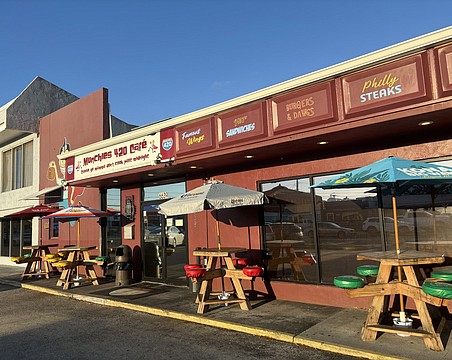Matt Walsh: Review and Comment
Gulf Coast Economy Ailing; Cut Taxes Now
Jobless claims are rocketing upward all along the southwest coast of Florida. In Lee County, they're up 130% (to 1,742) from a year ago April. In Charlotte and Collier counties, they're up 112% (to 435, 625, respectively). In Manatee, they're up 83% (to 652), and in Sarasota they're up 68% (to 910).
After hitting a low in 2006, unemployment rates are rising.
We know why.
Of course we all know about the downturn in home building, new-home sales and resales. But the economic downturn has been spreading quickly - especially so in Sarasota and Manatee, where nearly everything is hooked to real estate.
Downtown Sarasota retailers, for instance, openly speak of their concerns about making it through the summer. Many of this year's charity events didn't draw the attendance of years past, nor the cash for their auctions. "Restaurants were very disappointed" with the season, says Virginia Haley, executive director of the Sarasota Visitors and Convention Bureau.
Meanwhile, commercial real estate brokers say the vacancy rates in flex space and office condominiums are rising as contractors and subcontractors contract. And there's not a residential real estate broker in Southwest Florida who will deny that prices still are going to keep falling. We haven't hit bottom yet.
This won't help the summer tourist season: $3 and $4 a gallon for gas.
Nor will these government-inflicted pains help: Homebuilders and developers say there's a de facto moratorium in East Manatee County and parts of Sarasota County because of inadequate road building by county governments and the Florida Department of Transportation.
On top of that, county governments keep adding to impact fees on homes and commercial buildings. A commercial broker told us last week he just finished constructing a 15,000-square-foot office building. The impact fees were $110,000! - on a building whose traffic generation will be minimal and whose requirements for police, fire, schools and parks will be almost nil.
(Elected officials don't get this: When you raise prices, i.e. impact fees, you sell less and you slow down the economy.)
In short, our part of the state is limping economically. And it's going to go down further before it goes up. John Swart, president of Lakewood Ranch Commercial Realty, has a 66-page Powerpoint presentation that demonstrates we have achieved "The Perfect Storm to Kill the Economy": rising impact fees, rising insurance costs and rising construction costs.
If ever there was a time for state, county, municipal and school governments to roll back tax rates and cut spending, this is it. Those two measures alone would help a waning economy immensely.
If ever there was a time for elected officials - local and state - to act like representatives of the people and not protectors of government budgets, now is the time for that type of leadership.
+ The Senate gets it: a cap on government spending
A key to re-igniting the Florida economy will occur next month when the Legislature reconvenes in special session to address property tax cuts.
So far, only the Florida Senate seems to get what needs to happen: cap government spending, roll back tax rates and give everyone - homesteaded, non-homesteaded and commercial owners - the benefit of Save Our Homes.
Don't bother reading the reports about House leaders who want to create a sliding scale of increased homestead exemptions. That idea will go nowhere in the Senate.
What's more, it misses the mark badly. A system of different tax tiers is a recipe for class warfare and social division. And it's complicated; it will add to government bureaucracy.
But where such an idea really misses the mark is here: Credible lawmakers know the problem has not been the increase in property taxes for homesteaded property owners. The non-homesteaded and commercial property owners are the taxpayers who have been getting slaughtered.
Senate leaders get this.
One of those who does is Sen. Lisa Carlton, R-Sarasota, a member of the committee that is crafting the special-session legislation. Carlton says the Senate's property tax package likely will consist of the following features:
A tax rollback for all property owners. Carlton says the rollback would take property tax levels back to fiscal 2003-2004 or 2004-2005. That's when the big spikes started occurring for non-homesteaded and commercial owners.
Indeed, Randy Holcombe, noted Florida State University economics professor, says his research shows property tax revenues increasing less than 8% a year between 1996 and 2001. But from 2001 to 2006, they rose 83% - clearly an abberation and one that caused all of this taxpayer grief.
Schools excluded. The rollback would not include school taxes. Senators don't have the guts for that - although that's where some of the most egregious spending has occurred.
Allowance for new construction. The rollback would contain a feature that would allow local governments to exclude from the rollback revenues from new construction during the previous years.
Portability for homesteaded property owners who sell. As we all know, one of the unintended consequences of Ken Wilkinson's Save Our Homes amendment is that it has trapped homesteaded homeowners. If they sell and move, they too get killed by the increase in their new property taxes.
Equal treatment for all property owners. Every owner - homesteaded, non-homesteaded and commercial - would get the advantage of a Save Our Homes-like cap on annual property tax increases.
This is essential. It makes no sense whatsoever that second-home owners and commercial properties are taxed at the highest rates. Look at it this way: They use the least amount of government services but they pay the most!
Cap on spending. Hooray! This is the most important feature in the Senate plan and the crux of the entire matter. Carlton says the Senate will include a statutory cap on government spending, likely tied to increases in population and personal income growth. We hope it includes a cap on school spending as well.
Even if it doesn't, a property-tax package like this would be historic. Better yet, it would re-ignite the state's economy and impose much-needed restraints on local government spending.
Call your legislator. Urge him to back the Senate proposal. We need it now.
+ FDOT: Disband it
Everyone should be celebrating in Lee and Collier counties with the expected start of construction next month to widen 35 miles of Interstate 75 from the Golden Gate interchange up to Colonial Boulevard in Lee.
This $470-million project was way overdue. But here's what is amazing: This project is on a fast track, thanks to Congressmen Connie Mack and Mario Diaz-Balart securing federal funds; the Florida Department of Transportation being willing to let construction begin before all of the design work is finished (a rare occurrence); and county governments contributes money now that the state will reimburse later.
While this is enlightened progress on the part of FDOT, it doesn't lessen the reality about FDOT: It should be disbanded. All of it road-building and maintenance functions should be privatized.
Everywhere you go, you hear homebuilders, developers and county commissioners bemoan the snail's pace of FDOT and the exorbitant costs it incurs to get a project completed. Look how long it took for the widening to begin on I-75 in Lee and Collier.
In Sarasota-Manatee, a similar widening on a 15-mile stretch has been needed for years. But only last summer did FDOT begin one of its routine development and environmental studies. FDOT is not expected to complete its study until June 2008 - two years later!
Imagine the private sector working like that. You'd be fired.





